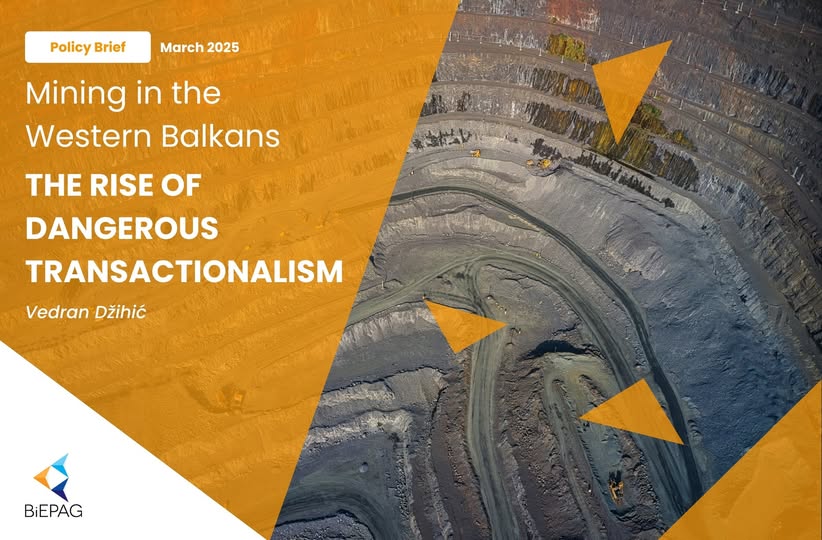
Against the background of highly dynamic and evolving critical raw materials and mining debates in the Western Balkans, there is a need for more facts, figures, insights and analysis of the issue. This is why our latest following policy brief "Minning in the Western Balkans" by BiEPAG member VedranDžihić maps the significant aspects and dilemmas of mining projects in the region.
It offers insights into the current dynamics and provides context to mining in the Western Balkans today, focusing on major contradictions behind the critical raw materials and mining debates. The paper offers several preliminary conclusions and some food for thought for further studies and critical engagement around the topic of mining in the region.
Main takaways:
- There are no guarantees that mining, under the current circumstances, will be a viable economic and developmental model for the future prosperity of the Western Balkans states. The institutions and economies in the Western Balkan countries are largely captured with significant deficiencies when it comes to the rule of law and transparent procedures. Therefore, even if substantial financial benefits might be reasonably expected, all evidence shows that this money would support the mechanisms of state capture, including the possibility of being shipped offshore.
- Environmental and health issues should be addressed in all mining projects in the Western Balkans, both those being implemented and those which are planned. While companies and local governments – recently also the EU – claim that the highest environmental standards will be kept and the most advanced environmental processes implemented, evidence from ongoing projects or similar ones globally suggests the risk of massive environmental degradation and neglect of health issues of local populations. In recent years, the dismal environmental track record of Serbia, Bosnia and Herzegovina and Montenegro is everything but a guarantee for adequate implementation of environmental measures and standards.
- International companies and EU member states have a clear financial interest in exploiting raw materials in the Western Balkans and appear ready to turn a blind eye to problematic developments in the countries’ governance for the sake of initiating and implementing the planned mining projects. The intense quest for raw materials and the EU’s apparent values-free “pragmatic” stance in this regard render the EU dependent on local elites and structures. The latter, in turn, will keep utilizing the new partnerships for their purposes – reducing criticism from outside, strengthening power, engaging in clientelistic and corrupt practices, etc. The primary negative outcome might paradoxically bring more economic growth but also more bad and authoritarian governance, with almost negligible positive effects for local populations, and a negative effect on the overall long-term prospects of the region.
- The EU’s Enlargement policy in the Western Balkans has been in crisis for years, with no significant progress. The EU’s Green Deal and the Critical Raw Material Act frame the region anew. While in the political framing of candidate countries democratization and economic and social convergence still dominate the narrative, the planned mining projects seem to change the equation between the EU and candidate countries in the Western Balkans: judging by the current state of the debate since the signing of the Memorandum of Understanding between Serbia and the EU, and given Germany’s strong interest in lithium, the sails seem to be trimmed to the new wind of the EU’s more pragmatic and transactional policy in the region. Vučić’s increasingly autocratic control of the state and society seems to be rewarded with economic transactionalism. Preliminary insights from Serbia show that the “lithium deal” between Serbia and the EU might contribute to further erosion of the EU’s credibility as a promoter and defender of democracy, the rule of law and human rights. Under these circumstances, we might expect that the value- and norm-based aspect of enlargement, which has increasingly weakened in the last few years, will further erode with significant adverse effects on democracy and potentially the stability and security of the region. In addition, it is reasonable to conclude that enlargement is largely on hold, if not dead as an EU willing to consider accepting such states into the Union would signal an end to the notion of the Union as a values-based entity.
- Citizens’ mobilisation around the topic of mining has significantly increased. Engaged citizens and activists can exercise certain pressure on governments and companies, thus creating at least a rudimentary system of checks and balances on ongoing and planned mining projects. However, the pressure from governments is rising, with harsh measures and even repression used in Serbia, as well as various forms of pressure and threats against activists in Bosnia and Herzegovina. There is also an increased risk of “far right ecologism” within the protest movements (particularly in Serbia in the Rio Tinto case), which might compromise the goals and aim of the movements.
The whole publication can be found at the following link.